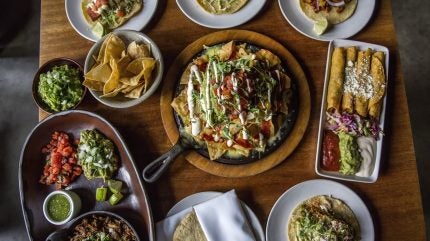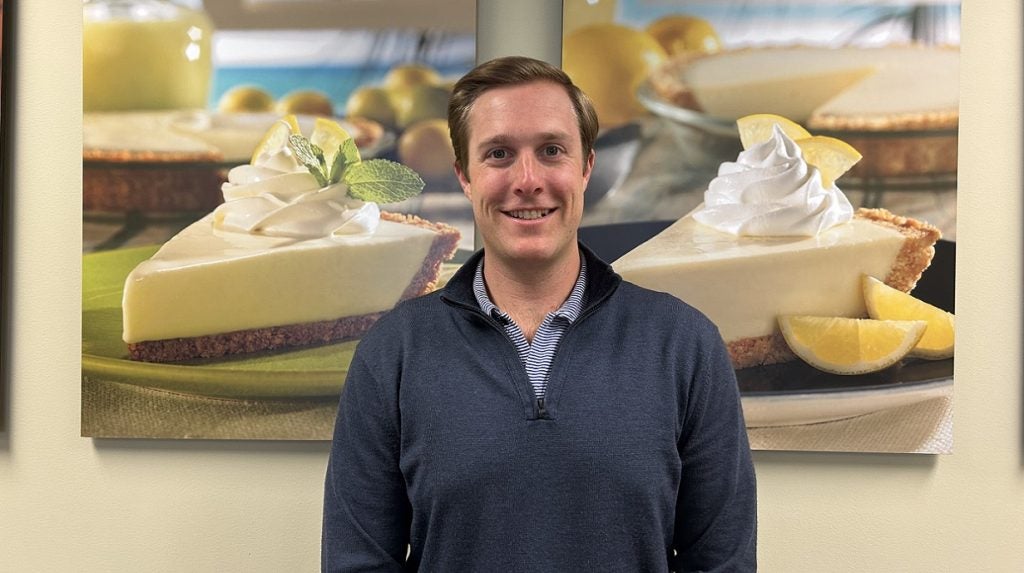
After selling US pie maker Kenny’s Great Pies earlier this year, private-equity firm Kaho Partners is embarking on its next move on food.
Managing partner Griffin Horter is leading Global Flavors Group, a newly-established “platform” to buy manufacturers of Mediterranean, Asian, Indian and Hispanic foods.

Discover B2B Marketing That Performs
Combine business intelligence and editorial excellence to reach engaged professionals across 36 leading media platforms.
He tells Just Food Kaho Partners is in talks with potential sellers and expects to finalise its first deal within the next 12 months.
Dean Best (DB): What’s sparked Kaho Partners’ interest in the market for international cuisine in the US?
Griffin Horter (GH): There are two tailwinds we’re investing behind. One is increasing diversity [in the US population] but the second, which I think is actually more powerful, is the growing interest in authentic international flavours from the overall US population. Every US citizen is being exposed to more people from different backgrounds, therefore more restaurants with international cuisines are opening in the US. You go to a grocery store, there’s more international food in the grocery store.
There was a great study that came out recently that interviewed a large group of Gen Z people and the question was: if you could eat one cuisine for the rest of your life, what would it be? And the answer was Mexican. The traditional answer to that question for the last 20 or 30 years had been Italian food. That used to be seen as international or ethnic but now it’s mainstream in the US. The fact that 45% of Gen Z respondents said that Mexican would be the one cuisine they would eat for the rest of their lives shows you that this is a trend for the overall population.
DB: Kaho Partners said it is looking for businesses generating less than $10m of profit. Why is that?
GH: We have pinned it at that level because we’re looking for small, nimble, growing companies. We’re not looking for companies that have already reached the scale where a PepsiCo might buy them as an example. Our vision here is that we’re not looking to buy one company. We’re looking to buy a handful, two handfuls of businesses over the next five to eight years so that we can have a portfolio of manufacturing assets and be the one-stop solution, one-stop shop, for these retailers to come to us for their authentic international cuisine needs.

US Tariffs are shifting - will you react or anticipate?
Don’t let policy changes catch you off guard. Stay proactive with real-time data and expert analysis.
By GlobalDataDB: Is your interest evenly spread across the four cuisine types?
GH: I would say it’s spread across them evenly to start with. What that means is I’m looking at companies in all of those cuisines today but, once we make the first acquisition, our focus for the platform will be on that cuisine. For instance, if the first company we buy is a Hispanic food manufacturer, then the platform is going to be focused on Hispanic food.
DB: Are you in any live discussions at the moment?
GH: Yes, I’m in a number of them.
DB: When do you expect the first deal to be announced?
GH: That is really hard to guess because most of the companies I’m in conversations with, they’re not auction processes, right? Those transactions can take a while because it’s kind of like dating. My hope is in the next six to 12 months. That’s my expectation.
DB: What other attributes would interesting businesses have to have for Global Flavors Group?
GH: The most important thing is they have to do their own manufacturing. We’re not looking to acquire brands that outsource their manufacturing. We’re looking to acquire companies that are great at sufficiently manufacturing authentic international cuisine. That’s number one. Number two is we want them to be focused on a small group of products. We don’t want to acquire a company that is making 600 different products. We want companies that are small, that are focused on a small handful of products, and are leaders in those products.
DB: What current retail distribution would they have to have to get Kaho Partners interested in talking to them?
GH: We would like to see companies that have broken into mainstream retail. International cuisine has traditionally gone to market through specialised retailers, which tend to be smaller stores. As these manufacturing companies get bigger, they can break into what’s referred to as mainstream retail, which tends to be customers like Sam’s Club, Walmart, Kroger, H-E-B. We want to acquire companies that are on that journey, who have already broken into mainstream retail but likely need help breaking into additional large national retail chains.
DB: Similar to the profitability benchmark, is there a level of sales you’re looking for?
GH: No, there isn’t. We’re just focused on making sure that the companies are profitable and that they’re less than $10m in profit.
DB: Given the fragmentation of the category, to what extent do you think that makes it harder to choose the right acquisition?
GH: I think it makes it easier for us. When we look for an industry to build a business in, fragmentation is one of the top two criteria we look for alongside growth tailwinds in an industry. We don’t want to focus on an industry that only has ten companies. Then you have to buy one of those ten. We want to look at industries that are very fragmented, so that we can look at 100 companies and find the best two or three to start with.
DB: What’s your assessment of the overall M&A environment in US food at the moment?
GH: I think that now is a very good time to be both buying and selling food businesses. I think what the pandemic taught buyers in the space is that one of the reasons we like food is people think that it’s recession-resilient. We saw that during Covid. Even when there are downturns in the economy, people still need to buy food.

M&A activity was very slow from call it ‘21 to ‘23 because there was some demand destruction due to Covid and then, when demand came back, there was hyperinflation, and all the companies were dealing with cost issues. A lot of the big acquirers, both strategics and private-equity funds, took a year or two off. We’re seeing a lot of activity in the M&A markets in the food space this year. I think a good example of that is our pie company. We got a ton of interest, much more interest than I expected to get to that business and that’s because a lot of buyers really wanted to play capital behind food.
DB: What level of funding do you have at your disposal for this platform?
GH: We partner with family offices because we like to build businesses over five to eight years. In order to do that, you can’t raise a private-equity fund, because if you do that, you can only spend three to five years building a business. What we will do for this one is partner with some of our existing family offices, and then our partnership, Kaho Partners, will invest a lot of money into the deal as well. It’s the money that’s coming from our partnership and then from our family office relationships.
DB: Are you able to give me a dollar figure?
GH: No, I can’t unfortunately.
DB: A lot could happen between now and then, obviously, but after that, five- to eight-year period, you’ll be looking to exit and sell on to either another PE firm or a potential interested buyer in the trade?
GH: Well, there are three potential outcomes. One is we sell to a private-equity fund. To be frank, this thesis we have in international cuisine isn’t rocket science. I like to tell people that this is a simple but very powerful idea. A lot of other people see these trends. One of the reasons we like this space is the bigger private-equity funds see this trend but there aren’t many scaled players. It’s a fragmented space and there are a lot of small companies but the companies are so small that most private-equity funds can’t buy them. You have a lot of big private equity funds who want to invest in this theme but there aren’t many scaled players. We’re going to build a scaled player.
I’m confident there will be a lot of interest from private equity in five to eight years. I’m also confident there will be a lot of interest from strategic acquirers in five to eight years. Those are our first two outcomes. We can settle one of those two. The third outcome is, if this is going really well and we believe in the growth story, we could keep holding the business, whether that’s through our existing investor base of family offices, which have a long-term investment horizon, or taking the company public. It’s difficult to say today. The good thing is we’ve optionality.
DB: Is Kaho Partners looking to invest in any other parts of the food industry?
GH: No. We’re very focused. We’re an investment partnership. We only build three or four companies at a time. This is the only company that we’re currently looking at platforms for. We’re not going to start a new business for the next probably four or five years. This is our focus in the food and beverage space.




